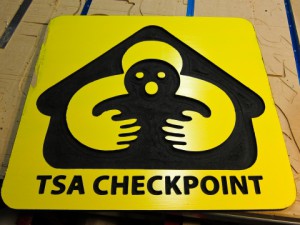By: Steve Watson
Prisonplanet.com
March 4, 2011
Source: http://www.prisonplanet.com/states-rebeling-against-tsa-texas-the-latest-to-legislate-for-banning-grope-downs-naked-scanners.html
Tenth Amendment allows for local governments to regulate airports
 Legislation has been introduced into the Texas House of Representatives that directly challenges the authority of the TSA in airports within the state, specifically aimed at criminalizing the use of naked body scanners and enhanced pat-downs.
Legislation has been introduced into the Texas House of Representatives that directly challenges the authority of the TSA in airports within the state, specifically aimed at criminalizing the use of naked body scanners and enhanced pat-downs.
Rep. David Simpson (R-Longview) introduced a set of bills earlier this week that would empower the Texas Attorney General to bring suit in court against any airport operator who installs or uses the full body imaging equipment or any operator who touches a person without consent and searches them without probable cause.
The bills, HB 1938 and HB 1937 would see criminal and civil penalties handed out to any TSA worker who was found to have contravened the laws.
HB 1938 reads in part:
(b) An airport operator may not allow body imaging scanning equipment to be installed or operated in any airport in this state.
(c) An airport operator commits an offense if the operator fails to comply with Subsection (b).
(d) An airport operator who commits an offense under Subsection (c) is subject to a civil penalty in an amount not to exceed $1,000 for each day of the violation.
HB 1937 includes the following:
(3) as part of a search performed to grant access to a publicly accessible building or form of transportation, intentionally, knowingly, or recklessly:
(A) searches another person without probable cause to believe the person committed an offense; and
(B) touches the anus, sexual organ, or breasts of the other person, including touching through clothing, or touches the other person in a manner that would be offensive to a reasonable person.
(f) …. An offense under Subsection (a)(3) is a state jail felony.
Constitutional watchdog, The Texas Tenth Amendment Center noted that “the Texas legislature stands on solid ground. Local governments control airports and no enumerated power in the Constitution gives the federal government the authority to regulate them. Under the Tenth Amendment, airport operation falls under state jurisdiction.”
Texas, and in particular Austin, has been at the forefront of the revolt against the TSA since it began increasing its presence in airports some eighteen months ago. In December, Austin’s Airport Advisory Commission approved a resolution advising the city council to oppose airport body scanners and invasive body searches.
The TSA has signaled its intention to install the scanners at Austin, but the date has continually been put back, with the agency saying it could now be as late as 2012 before the devices are activated.
Stock up with Fresh Food that lasts with eFoodsDirect (AD)
Texas is the latest state to introduce anti-TSA legislation, as a growing number seek to revolt against the federal government’s enhanced presence in airports and other transport hubs.
Earlier this week, New Hampshire introduced legislation that would classify the TSA’s use of enhanced pat-downs as sexual assault, punishable in the same way as other sexual offenses.
House Bill 628-FN, co-sponsored by both sides of the political spectrum would classify “the touching or viewing with a technological device of a person’s breasts or genitals by a government security agent without probable cause a sexual assault.”
Any government worker found guilty of such an offense would be classified as “tier III offenders under the criminal offenders registry” should the bill be passed.
“Let’s put their name on the sex offender registry, and maybe that will tell them New Hampshire means business,” stated cosponsor Rep. Andrew Manuse (D-Derry). Cosponsor Rep. George Lambert (R-Litchfield) stated that “we should charge (agents) every single time” they assault passengers with a pat down or naked body scan.
A number of other lobby groups, state and local authorities around the country have also resolved to either block the body scanners or kick the TSA out of airports altogether, including New Jersey, where Republican state Senator Mike Doherty has vowed to push for legislation that will ban both the scanners as well as invasive groping techniques.
“It is with great sadness that I have come to recognize that one of our greatest threats has been presented by officials of the TSA who have begun to implement intrusive searches of law abiding Americans who are traveling within our borders.” Doherty has said.
“I am drafting new legislation that will make it perfectly clear that in New Jersey, our Constitutionally granted civil liberties are treasured and will be protected. I am calling upon my colleagues in the Legislature to step up and co-sponsor legislation that will protect the rights of citizens in New Jersey,” he added.
The TSA has not officially responded to the proposals in Texas and New Hampshire, however, in a speech at the American Bar Association’s (ABA) 6th Annual Homeland Security Law Institute in Washington yesterday, TSA head John S. Pistole intimated that the agency was considering completely changing its security procedures away from a “one size fits all” approach towards a more “intelligence-driven system,” that would focus on “higher-risk passengers,”
“Everyone is familiar with the current system in place that screens nearly everyone the same way,” Pistole said. “My vision is to accelerate TSA’s evolution into a truly risk-based, intelligence-driven organization in every way.” he added, without being specific about what such changes would entail.